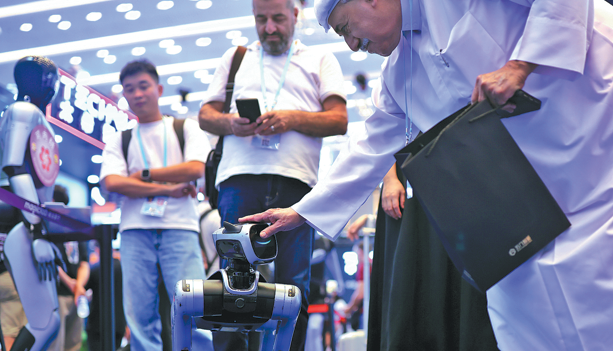Robots take center stage as Canton Fair showcases smart tech, creativity


GUANGZHOU — A humanoid robot that can pour you a glass of water, a spherical robot that can move and stop precisely at any point, and an artificial intelligence-powered robotic dog that climbs steep slopes and even bows for photos represent just a small sampling of innovative, advanced robots drawing huge attention at the ongoing 138th Canton Fair.
The fair, which is known officially as the China Import and Export Fair, opened on Oct 15 in South China's Guangzhou, capital of Guangdong province. Attracting a record of more than 32,000 exhibitors, this is the second time that the fair has featured a service robot zone, which has this year gathered 46 leading service robot companies to showcase cutting-edge products.
"China has become a leading force in the robotics industry. I am impressed by the variety and quality of these robots. There are several products that I think will be welcomed in Middle East countries, and we have started discussions with Chinese companies," said Muntasar Albeshaier, a buyer from Saudi Arabia.
Albeshaier was particularly intrigued by a massage robot produced by DOBOT, a world-leading collaborative robot company based in Guangdong's Shenzhen, one of the nation's innovation hubs. The robot offers visitors 15-minute on-site massages at the DOBOT booth, and has been working nonstop as visitors line up for Chinese-style massages, said Li Jiaxian, a brand manager at the company.
"I think it's comfortable. I've never tried something like this in any other country," said Nazeef Bala Hadith, a buyer from Nigeria.
This year, DOBOT has also brought a coffee-making automaton that has achieved full-process automation. "The robot has been deployed in transport hubs and at tourist attractions across dozens of Chinese cities, and is being used widely in foreign markets such as Japan, the United States and Europe," Li said.
"China's complete manufacturing chain and booming algorithm control software have provided strong support for the development of our company, enabling us to obtain high-quality supplies and create rapidly iterative and optimized products," Li said.
This industry boom is also reflected in international data. A recent report released by the International Federation of Robotics, a Frankfurt-based nonprofit organization, shows that China had over 2 million industrial robots in operation by the end of 2024, ranking first globally. Chinese robots, the report notes, are demonstrating broad application prospects in fields such as automobiles, electronics, metal machinery, household services, medicine and education, gradually moving from laboratories to factory production lines, and then into the homes of people in countries around the world.
A robotic dog produced by CVTE, a high-tech company focused on interactive displays and AI, has been widely photographed at the fair. Empowered by the company's self-developed AI algorithms, the robotic dog can climb slopes of up to 35 degrees with ease, and can operate smoothly on grass, gravel and sand surfaces.
"China's technology has been accumulating over the years and has now entered a period of fast growth. China also has a vast application market for these technologies to develop, which promotes our robot technology products," said Wang Xu, a manager at CVTE.
Founded in 2005 in Guangzhou, CVTE started its business by making mainboards for televisions and then moved to interactive display screens. Its research team accumulated experience in algorithm development, which has allowed the company to grasp its opportunity in the robotics industry at a rapid pace.
According to data released at the World Robot Conference in Beijing, China's robotics sector generated nearly 240 billion yuan ($33.4 billion) in revenue in 2024, and in the first half of 2025, industrial robot production in the country reached 370,000 units. The Chinese robotics industry is clearly seeing robust growth both in revenue and application.
"Our annual sales have amounted to over 22 billion yuan for four consecutive years, with about 5.4 billion yuan in overseas sales in 2024 — a year-on-year rise of 17.5 percent. The cleaning robots sell very well overseas," Wang said.
Despite use in manufacturing and retail, Chinese robots are also showing increasing potential in terms of medical applications. During the fair, the Yuanhua Tech booth has been surrounded by foreign buyers drawn to watch a robotic arm make precise surgical cuts in a manikin, following the commands of an operator. Li Aili, founder and chairman of Yuanhua Tech, said that the company's surgical robot products have performed thousands of surgeries in hospitals across the Chinese mainland and Hong Kong.
"Our surgical robots — with a margin of error of less than 0.5 millimeters — have performed over 5,000 clinical surgeries, and they have obtained medical licenses in Europe, Southeast Asia and the Middle East," he said.
Going forward, he noted that the company hopes to benefit patients in other countries through the export of its robotics technology and products, and to showcase the strength of Chinese manufacturing and innovation.
Xinhua




































